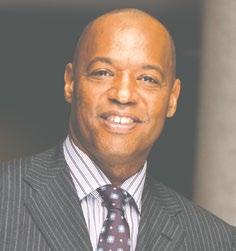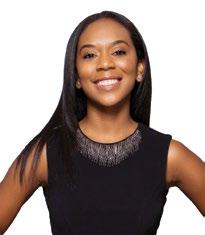
4 minute read
EXECUTIVE SUITE BLACK BANK MOVEMENT ENCOURAGES FINANCIAL POWER TO CREATE SOCIAL CHANGE
BY MICHELLE SOLOMON
Like the collective unity seen in protests across the United States, Kevin Cohee said the same effect for change works when looked at from a financial point of view to make a powerful statement about racial equality in America.
Advertisement
“It’s all about garnering the economic spending power of Black America and rechanneling it back to our communities in ways that can help us build political and social strengths,” said Cohee, owner, chairman, and chief executive officer of OneUnited Bank, the largest Black-owned bank and the first Black-owned Internet bank in the country.
In 2016, he also spearheaded the #BankBlack movement, where Black Americans were encouraged to transfer their money into Black-owned banks as a form of social protest. The movement continues with the intention that when people #BankBlack, the result is better circulation of Black dollars with Black businesses, and the power of the Black dollar is increased.
“We need to rechannel that money back into Black-American communities and causes,” said Cohee, who is at the forefront of making it happen.
Aligning financial literacy with social protest is an agent of change, Cohee explained. “OneUnited Bank started to help organize Black Americans to be more effective from an economic perspective…to empower the community and close the racial wealth gap,” Cohee added.
There are 21 Black-owned banks in the U.S., a staggeringly small number considering that there are more than 5,500 banks across the country. Minority-owned banks and credit unions represent just 1 percent of America’s total commercial banking assets.
It is Cohee’s OneUnited Bank that remains the largest Black-owned bank. Since 1996, OneUnited’s assets have grown from $56 million to more than $656 million.
OneUnited Bank’s People’s National Bank of Commerce in the Liberty City neighborhood of Miami became part of the OneUnited Bank group when Cohee began combining several community banks across the country after purchasing a controlling interest in Boston Bank of Commerce in Boston’s Roxbury neighborhood in 1995. That was the beginning. The Liberty City bank was one of three Cohee picked up, which also included Founders National Bank, and Family Savings Bank in South Central, Los Angeles.
The seed of this fire for the power in financial literacy started as a kid growing up in Kansas City, Mo.
“In the beginning, there was little Kevin who was born into a family of Black Panthers,” Cohee reflected. “I had all of these uncles and all of these cousins who were young, strong men, on their way to college or in college, who, in the 1960s, were doing what they could to bring equality to society.... From the time I was 3, 4, 5-years old – they’d be in the basement of my house having meetings.” Cohee said he would be at the top of the stairs listening. He recalled, “like it was yesterday” a defining moment.
“One day, one of the brothers says to me, ‘You know, Katman, look, the thing is we have enough brothers out here in these streets fighting these battles, what we need are some brothers to be doing some stuff to be in control of some institutions in order for us to be effective in our society. We need you to do something like get a bank, own a bank, something like that.’”
Banking didn’t happen first. Entrepreneurship was Cohee’s initial route. He founded a consulting firm in 1979, which specialized in acquisitions of minority-owned radio and television stations. Six years later, he earned his Juris Doctor degree, a Master of Business Administration, and became an investment banker.
Three years after that, he acquired Military Professional Services, a company that marketed credit cards to military personnel. He turned it profitable and by 1993, sold the company’s assets, which by that time had a $40 million portfolio and 20,000 customers.
“The advice that I was given when I was little Kevin guided me through life,” he shared. “I made a lot of money when I was really young, so it gave me the freedom and the resources.”
Since then, Cohee has harnessed the power of the Internet for banking, which he says is a continually opening door. “Technology levels the playing field for every American,” he said.
In July, OneUnited Bank doubled its customer base to “50,000 new customers because of technology that can bring in accounts across the county,” he explained.
Corporations are also taking notice of Black America’s spending power and the racial wealth gap.
At the end of June, Netflix became the latest corporation to invest major resources in Black-owned banks, CNN reported. It has committed to depositing 2 percent of its cash, or an estimated $100 million, into Black-owned financial institutions.
“Corporations are recognizing that maybe they need to do the right thing to help perpetuate American values – justice and liberty, all those concepts that have bypassed Black Americans since we got here.” n












